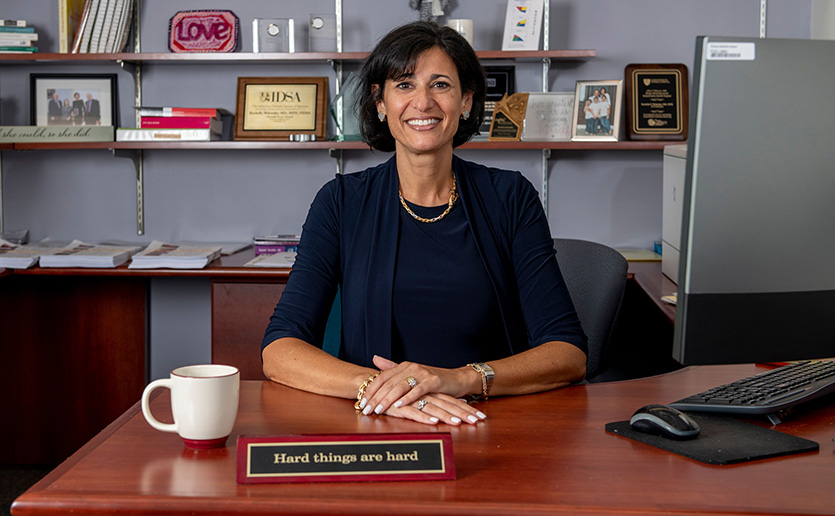The plaque on the desk reads ‘Hard things are hard,’ and those four words tell you all you need to know about how Rochelle Walensky, MD, MPH, chief of Massachusetts General Hospital’s Division of Infectious Diseases, and a Steve and Deborah Gorlin MGH Research Scholar, views her work.
“It’s a replica of the one President Obama had when he was in office,” Dr. Walensky says. “It’s a reminder that it’s my job to roll up my sleeves and fix things — but it’s never going to be easy.”
Dr. Walensky has spent her career looking at complex questions of disease management across broad populations, with a strong focus in HIV/AIDS. In May 2019, she testified before the U.S. House Committee on Oversight and Reform about the high cost of Truvada, a drug that can reduce the risk of contracting HIV by as much as 95% if taken daily — a method known as pre-exposure prophylaxis, or PrEP. In a recent interview, Dr. Walensky spoke about her testimony, her role as a scientist and public health advocate, and the shifting challenges of infectious diseases.
I am so grateful for the MGH Research Scholars funding, which allows me the flexible time and effort to be able to do this kind of work.
Why were you asked to testify about drug pricing?
I’ve studied the cost-effectiveness of HIV treatment for most of my career. In 2017, we demonstrated how much it would cost to get HIV 90% suppressed in the United States. This spring, Rep. Elijah Cummings’ office called me with some questions about the cost of PrEP. They asked if I’d be open to being part of a hearing on the subject. Previously, I’d briefed congressional staffers, and participated in some advocacy on Capitol Hill — but never anything like that. The setting was high stress, but it was something I felt I could uniquely speak to. I am so grateful for the MGH Research Scholars funding, which allows me the flexible time and effort to be able to do this kind of work.
How do you see your role as a public health advocate in that sort of situation?
I’m not a picketer, I’m not an economist, I’m a physician scientist. I need to be directed by a question. My role is to convey my findings to the policy makers in plain English so they can make the most informed decisions. In this case, that means making sure that everyone who needs PrEP can get it, and that begins with bringing the cost of these drugs down.

What drew you to public health and infectious disease?
I was in my first year of medical school when Magic Johnson announced he had HIV. I remember walking into the lecture hall and everybody was poring over the newspaper. Later, during my internship, the combination of drugs known as the “AIDS cocktail” was introduced. I was working in inner city Baltimore at the time and many of the patients we were treating were dying of the disease. We had nothing to help these people, and then suddenly, we did. The cocktail was literally the difference between life and death for these patients. That was a pretty formative time.
As chief of the Division of Infectious Diseases, what challenges are you facing?
I’m very concerned about antimicrobial resistance. Anywhere between 30 to 40% of patients in this hospital at any given time are on antibiotics. And resistance amounts to poor patient outcomes and large expenditures. There’s also a huge epidemic of sexually transmitted infections going on. Syphilis rates, for instance, are higher in Boston than they have been since the early 90s. Back then, it was attributed to crack and cocaine, so there is speculation this current trend is related to the opioid epidemic.
But the thing that really keeps me up at night is our pipeline. As recently as two years ago, there were fewer applicants in infectious diseases than there were available fellowships. We simply aren’t training enough people. And yet, the need is greater than ever.
I like to say if it’s medicine and it’s in the news, it’s probably infectious diseases.
What’s behind the decline in infectious disease specialists?
It’s interesting, because surveys show that overall, infectious disease specialists are among the most satisfied physicians, and generally quite fulfilled in the work they do and the care they provide. I think the challenge is partially the confluence of relatively low salaries and high loans, and a concern about reduced funding for research. Infectious disease is not a lucrative field — we don’t have any procedures we bill for — and most trainees are carrying $200,000 of loans when they get out of medical school. It’s especially difficult to recruit to young doctors to the field, and especially to a place like Boston, where the cost of living is so high.
How can philanthropy make a difference?
It can make all the difference in recruiting talented young scientists — especially under-represented minorities and women. Imagine how much it would mean if we could offer our trainees childcare? Loan repayment? A guaranteed research grant? That would make an extraordinary difference to our fragile pipeline.
What would you say to someone considering a career in infectious disease?
Infectious diseases aren’t going away. I like to say if it’s medicine and it’s in the news, it’s probably infectious diseases. The field needs you. The world needs you.
To learn more about how you can support the MGH Research Scholars program, please contact us.
